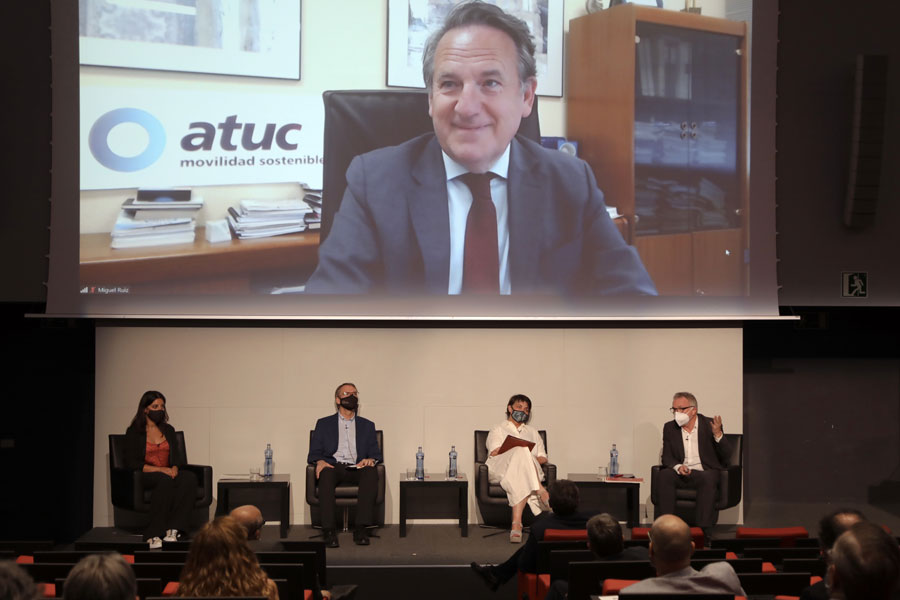The activity of Transports Metropolitans de Barcelona (TMB), the public group that manages the metro and bus network, generates an overall value of 2,395.6 million euros per year for Catalonia as a whole, 6.5 times more than what it receives in contributions from the administrations, according to the study "Impact of the social, economic and environmental value of TMB", carried out by the UPF Barcelona School of Management.
The activity of Transports Metropolitans de Barcelona (TMB), the public group that manages the metro and bus network, generates an overall value of 2,395.6 million euros per year for Catalonia as a whole, 6.5 times more than what it receives in contributions from the administrations, according to the study "Impact of the social, economic and environmental value of TMB", carried out by the UPF Barcelona School of Management. The study, which was presented today in the school's auditorium, concludes that TMB works as a "real economic and social tractor that drives and dynamises the territory it serves".
"This is a pioneering study", said the co-author of the study and researcher at the UPF-BSM Sustainability Observatory, Erola Palau Pinyana, because although there are examples of similar studies on the economic impact of a company on the territory, for the first time the contribution of a public transport operator has also been measured in social and environmental terms. Oriol Amat, rector of the UPF and co-author of the study, also supported this idea and predicted that "this study will become a benchmark in our country".
"This study will become a benchmark in our country"
Oriol Amat, rector UPF
The aim of the study was to calculate the overall value that TMB's activity generated in the territory where it provides services (Barcelona and 10 municipalities in the urban continuum), in the rest of the metropolitan area (AMB) and in Catalonia as a whole during 2019. To determine this integrated social value, Palau Pinyana described the economic value (the impact it has on the economy in terms of income and employment) and also the social and environmental value (the savings generated in negative externalities for society in terms of management, pollution, accidents and curbing climate change, among others).
"At TMB we want to be a cornerstone of innovation and an economic engine", said TMB's president, Rosa Alarcón, who took part in the event, together with the CEO of the company that manages public transport in the AMB, Gerardo Lertxundi, who said that "we are a citizen mobility company that is a benchmark in the world for our commitment to society, citizens, stakeholders and workers".
The results of the studyAccess to the study
As Palau Pinyana explained, TMB's activity in 2019 generated an economic value of 1,394 million euros in the metropolitan area of Barcelona, 1.02% of the city's GDP, and 1,689 million euros in Catalonia as a whole, 0.67% of Catalan GDP. In terms of jobs, there were 22,899 in the AMB and 27,887 in Catalonia, 1.33% and 0.802%, respectively.
In terms of social and environmental impact, the service provided by TMB represents an annual saving of 706.5 million euros in externalities. This is the additional cost that society would bear if TMB did not exist. "Each public euro invested in TMB generates 6.5 euros as a return to society. Public transport is not a deficit, it is an investment", said Lertxundi in conclusion, and recalled that "public transport connects people with their jobs and leisure and is vital for economic recovery".
Public transport is not a deficit but an investment
Thus, the main conclusion of the study is that, in addition to providing a quality transport service to citizens (627.4 million passengers in 2019), the activity carried out by TMB more than repays the contributions it receives, which should be considered highly profitable investments and not a cost.
Miguel Ruiz, president of ATUC Sustainable Mobility, focused his speech on the financing of public transport, defining the issue as "the problem in capital letters". "The main problem of the sector is the financing of public transport, as in Spain there is no law to finance it", he explained, and regretted that "the subsidy for urban public transport has been in place for 25 years, but it is asymmetrical and does not allow services to be planned".
